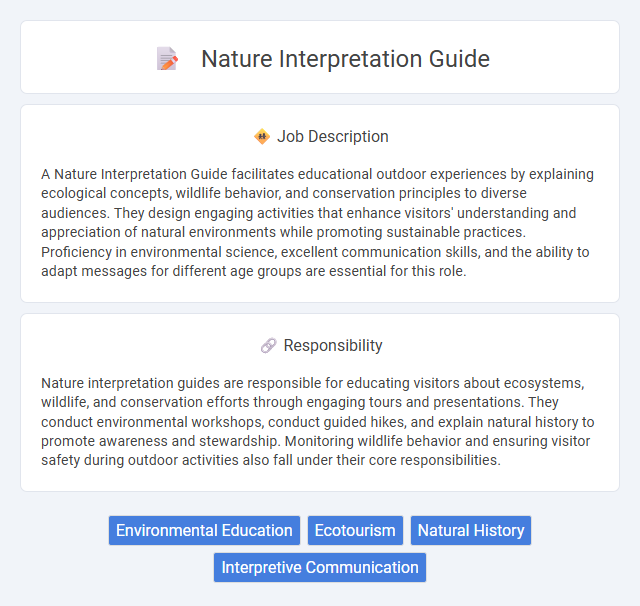
A Nature Interpretation Guide facilitates educational outdoor experiences by explaining ecological concepts, wildlife behavior, and conservation principles to diverse audiences. They design engaging activities that enhance visitors' understanding and appreciation of natural environments while promoting sustainable practices. Proficiency in environmental science, excellent communication skills, and the ability to adapt messages for different age groups are essential for this role.
Individuals who enjoy spending time outdoors and have a strong interest in environmental education are likely to be well-suited for a nature interpretation guide job. Those with good communication skills and patience may find it easier to engage diverse groups and explain complex ecological concepts effectively. People who prefer a structured indoor environment or have limited physical stamina might find this role challenging due to the physical demands and variable weather conditions.
Qualification
A Nature Interpretation Guide typically requires a strong background in environmental science, biology, or ecology, complemented by excellent communication and storytelling skills to engage diverse audiences. Certifications such as Leave No Trace Trainer, First Aid/CPR, or Wilderness First Responder enhance credibility and safety preparedness. Experience leading outdoor educational programs and a passion for conservation are essential to effectively convey information and foster environmental stewardship.
Responsibility
Nature interpretation guides are responsible for educating visitors about ecosystems, wildlife, and conservation efforts through engaging tours and presentations. They conduct environmental workshops, conduct guided hikes, and explain natural history to promote awareness and stewardship. Monitoring wildlife behavior and ensuring visitor safety during outdoor activities also fall under their core responsibilities.
Benefit
Working as a Nature Interpretation Guide likely offers the benefit of fostering a deep connection with the environment while educating the public about natural ecosystems. This role probably enhances communication and observational skills through engaging storytelling and interactive tours. The position may also provide opportunities for outdoor activity and personal growth in environmental awareness.
Challenge
The role of a nature interpretation guide likely involves the challenge of effectively communicating complex ecological concepts to diverse audiences with varying levels of prior knowledge. Adapting explanations to engage both children and adults while ensuring accuracy and fostering appreciation for the environment probably requires strong interpersonal and educational skills. Managing unpredictable outdoor conditions and ensuring visitor safety might also present ongoing obstacles in this position.
Career Advancement
A Nature Interpretation Guide gains career advancement by developing expertise in environmental education, wildlife ecology, and public speaking skills. Opportunities often include progressing to senior guide roles, educational coordinator positions, or park management jobs within conservation organizations. Continuous certification and specialization in areas like geospatial analysis or endangered species contribute significantly to professional growth and leadership potential.
Key Terms
Environmental Education
Nature interpretation guides play a crucial role in Environmental Education by facilitating immersive outdoor learning experiences that deepen public understanding of ecosystems, wildlife, and conservation practices. These professionals utilize storytelling, hands-on activities, and scientific knowledge to engage diverse audiences, promoting environmental awareness and stewardship. Effective nature interpretation fosters a connection between individuals and natural habitats, encouraging sustainable behaviors and support for environmental protection initiatives.
Ecotourism
Nature interpretation guides play a crucial role in ecotourism by educating visitors about local ecosystems, wildlife, and conservation efforts. They use storytelling and interactive methods to foster environmental awareness and promote sustainable travel practices. Their expertise enhances the visitor experience while supporting the preservation of natural habitats.
Natural History
Nature interpretation guides specializing in Natural History provide educational tours that explain the geological formations, plant species, and animal behaviors within ecosystems. They utilize scientific knowledge and engaging storytelling to enhance visitors' understanding of biodiversity and environmental processes. Their expertise supports conservation efforts by fostering appreciation and awareness of natural heritage.
Interpretive Communication
A Nature Interpretation Guide specializes in interpretive communication by translating complex ecological and cultural information into engaging, accessible narratives for diverse audiences. They use storytelling techniques, sensory experiences, and interactive methods to enhance visitors' understanding and appreciation of natural environments. Proficiency in environmental education and audience engagement strategies is essential for effectively conveying conservation messages and fostering meaningful connections with nature.
 kuljobs.com
kuljobs.com